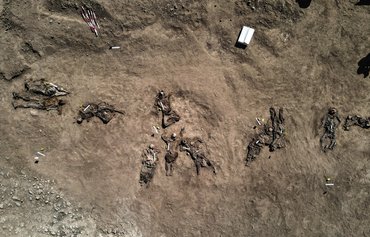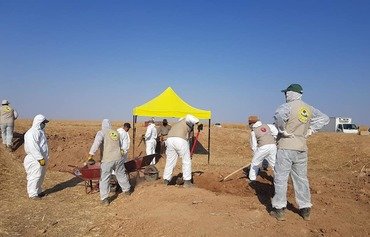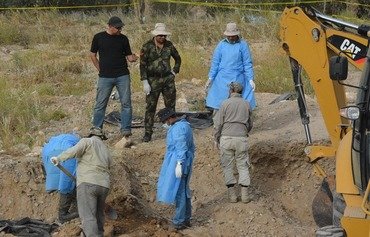Iraqi forces have found two new mass graves north of Mosul that contain the remains of hundreds of Badush prison inmates who had been killed by the "Islamic State of Iraq and Syria" (ISIS) three years ago, officials said.
Since making the discovery, security forces have been looking into what happened to these victims and trying to exhume the burial site and retrieve their remains, said Joint Operations Command spokesman Brig. Gen Yahya Rasul.
Speaking with Diyaruna on Wednesday (August 30th), Rasul said the grave sites in Badush, 15 kilometres north of Mosul, had been found a few days earlier.
Both contain the remains of executed inmates, he said, noting that "one of the sites contained the remains of 430 victims and the other 70, bringing the total to 500".
The Iraqi government has commenced efforts to remove human remains from both sites in order to conduct a DNA test for each victim that will be matched with DNA samples taken from family members in order to identify them, he said.
The discovery confirmed previous media reports about the existence of a mass grave for executed prisoners, based on the testimony of local fighters.
'No doubt' victims are prisoners
The first mass grave in the area was discovered less than a week after Iraqi forces on March 8th captured Badush prison from ISIS, Rasul said.
Most of the victims were from central and southern Iraqi provinces, indicating that the executions were fueled by sectarianism, he added.
"There is no doubt that the two discovered graves were for the prisoners of Badush," Ninawa provincial council security committee chairman Mohammed Ibrahim told Diyaruna.
"We had been receiving information about this horrendous crime," he said, and heard that ISIS "first rounded up all the inmates" -- about 3,000 in total.
The group then "identified those that were from the central and southern provinces by relying on information from other inmates", he added, before shooting them and setting fire to their bodies.
"Only a handful of prisoners survived this massacre, with the help of locals who took them to the Ninawa Plains area," he said.
Most of the prisoners had been serving sentences for petty crimes when ISIS attacked on June 11th, 2014, Ibrahim said.
Experts working to identify bodies
Since the discovery of the mass graves, a team of senior officials and medical experts from Ninawa has been formed to follow up on the situation, Ibrahim said.
"The team still has a long way to go, as all the remains have to be retrieved and medically examined," he said. "After the victims have been identified, they will be handed over to their families for proper burial."
The newly discovered grave sites are yet another example of the barbarity of ISIS and its countless crimes against humanity, said Ninawa provincial council human rights committee chairman Ghazwan Hamed.
"Over the past two years, a large number of mass graves were found in Ninawa, where innocent victims of all backgrounds were buried," he told Diyaruna.
"There were several graves that have been found in the towns of Sinjar and Sinoni, but the worst one was the mass grave in al-Khasfa -- or what has been dubbed 'the death hole'," he said.
The victims’ bodies were not handed over to their families, but were dumped on top of each other in al-Khasfa mass grave near Hamam al-Alil district in southern Mosul, he said.
During its occupation of Mosul, ISIS conducted mass killings of city residents it deemed disloyal, he said, estimating that there could be as many as 5,000 bodies in area mass graves.
"These crimes are evidence of the dark period in our country and should be considered as genocide by the world," he said.
Hamed said his committee is working to document all the violations perpetrated by ISIS and put together detailed reports to raise to the relevant organisations.

![A team of experts is seen working to retrieve the remains of 'Islamic State of Iraq and Syria' victims from a mass grave in Salaheddine province in this photo, posted online on July 16th. [Photo from the Iraqi Ministry of Health Facebook page]](/cnmi_di/images/2017/09/11/9434-mass-grave-iraq-600_384.jpg)






